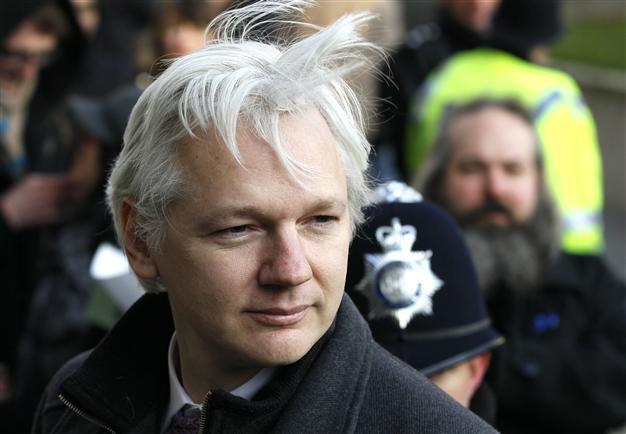'Colonial times are over,' Ecuador tells Britain in spat over Assange asylum
QUITO / LONDON

AP Photo
Britain said today that any decision by Ecuador to give Julian Assange political asylum wouldn't change a thing and that it might still revoke the diplomatic status of Quito's embassy in London to allow the extradition of the WikiLeaks founder.The high-profile Australian former hacker has been holed up inside the red-brick embassy in central London for eight weeks since he lost a legal battle to avoid extradition to Sweden, where he is wanted for questioning over rape allegations.
Britain's tough talk on the issue takes what has become an international soap opera to new heights since Assange angered the United States by publishing secret U.S. diplomatic cables on his WikiLeaks website. It may also raise difficult questions for London about the sanctity of embassies' diplomatic status.
The Ecuadorean government, which said it would announce whether it had granted Assange's asylum request on Thursday at 7 a.m. (1200 GMT), has said any attempt by Britain to remove the diplomatic status of its embassy would be a "hostile and intolerable act".
"It is too early to say when or if Britain will revoke the Ecuadorean embassy's diplomatic status," a Foreign Office spokesman said. "Giving asylum doesn't fundamentally change anything."
"We have a legal duty to extradite Mr. Assange. There is a law that says we have to extradite him to Sweden. We are going to have to fulfill that law."
Outside the embassy, British police tussled with protesters chanting slogans in support of Assange and at least three supporters were detained.
Quito bristled at Britain's warning.
"We want to be very clear, we're not a British colony. The colonial times are over," Ecuadorean Foreign Minister Ricardo Patino said in an angry statement after a meeting with President Rafael Correa.
Britain's threat to withdraw diplomatic status from the Ecuadorean embassy drew criticism from some former diplomats who said it could lead to similar moves against British embassies.
"I think the Foreign Office have slightly overreached themselves here," Britain's former ambassador to Moscow, Tony Brenton, told the BBC.
"If we live in a world where governments can arbitrarily revoke immunity and go into embassies then the life of our diplomats and their ability to conduct normal business in places like Moscow where I was and North Korea becomes close to impossible."
Addressing staff at the Ecuadoran embassy in London where he took refuge two months ago, Assange said: "It is a significant victory for myself, and my people. Things will probably get more stressful now."
Sweden, meanwhile, said it rejected Ecuador's claim that Julian Assange, the WikiLeaks founder wanted by Stockholm, would not have a fair trial as a reason for granting him political asylum.
"Our firm legal and constitutional system guarantees the rights of each and everyone. We firmly reject any accusations to the contrary," Foreign Minister Carl Bildt said on his Twitter account. Assange sought refuge in the Ecuadoran embassy in London on June 19 after a British court ruled he could be extradited to Sweden for for questioning about allegations of rape and sexual assault.
















